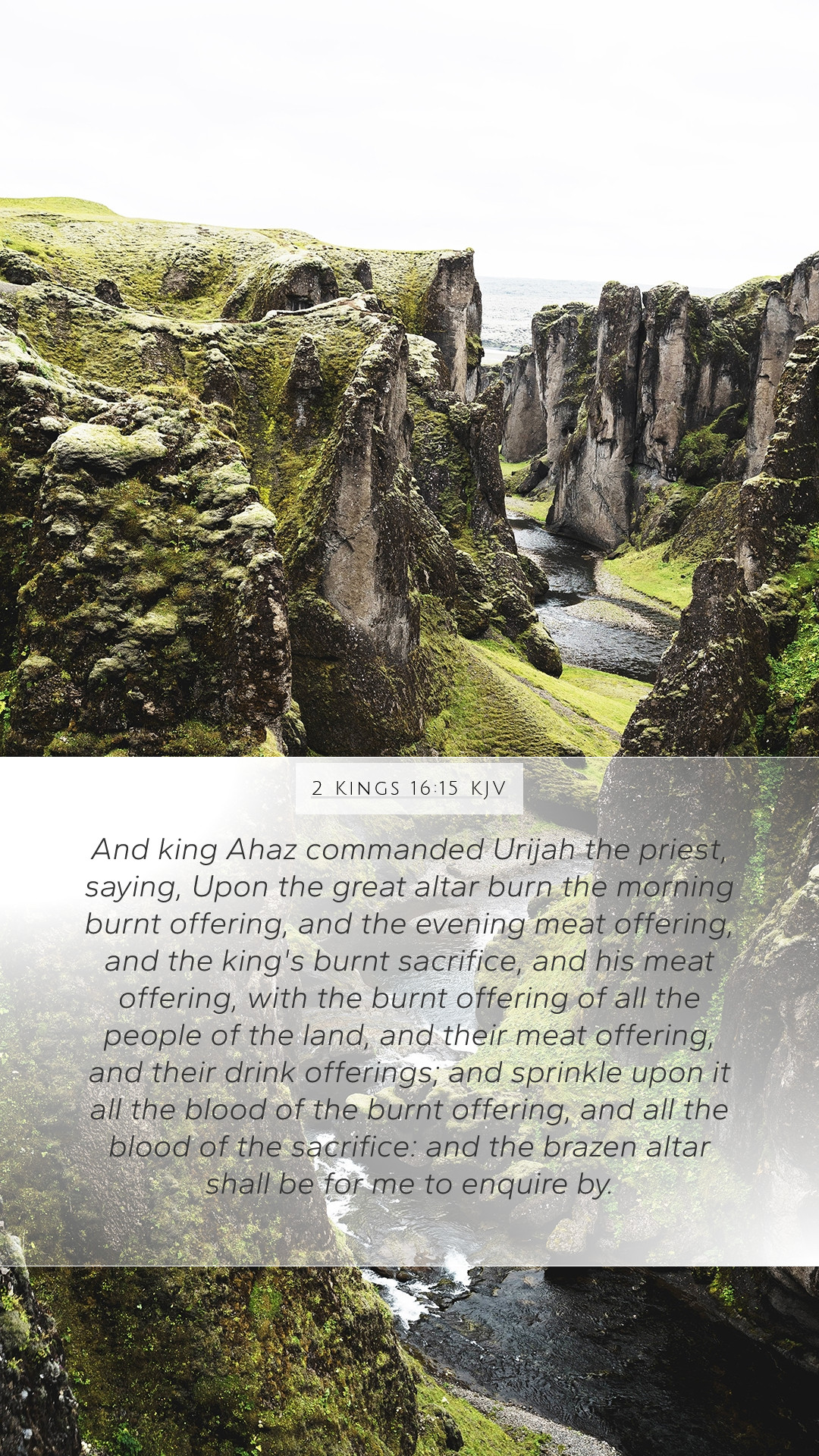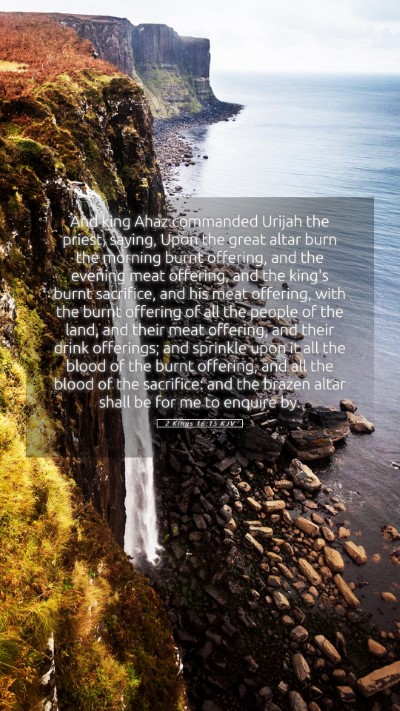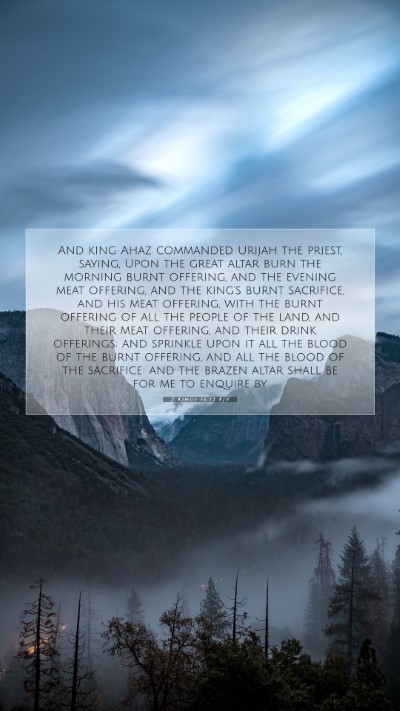Old Testament
Genesis Exodus Leviticus Numbers Deuteronomy Joshua Judges Ruth 1 Samuel 2 Samuel 1 Kings 2 Kings 1 Chronicles 2 Chronicles Ezra Nehemiah Esther Job Psalms Proverbs Ecclesiastes Song of Solomon Isaiah Jeremiah Lamentations Ezekiel Daniel Hosea Joel Amos Obadiah Jonah Micah Nahum Habakkuk Zephaniah Haggai Zechariah Malachi2 Kings 16:15 Meaning
What is the meaning of 2 Kings 16:15?
And king Ahaz commanded Urijah the priest, saying, Upon the great altar burn the morning burnt offering, and the evening meat offering, and the king's burnt sacrifice, and his meat offering, with the burnt offering of all the people of the land, and their meat offering, and their drink offerings; and sprinkle upon it all the blood of the burnt offering, and all the blood of the sacrifice: and the brazen altar shall be for me to enquire by.
2 Kings 16:15 Bible Verse Meaning
Understanding 2 Kings 16:15
The verse 2 Kings 16:15 presents a critical moment in the history of Israel, reflecting the spiritual and political turmoil of the time. In order to gain a comprehensive understanding of this passage, let's explore the insights gathered from prominent public domain commentaries, including those by Matthew Henry, Albert Barnes, and Adam Clarke.
Verse Text
2 Kings 16:15 (KJV): "And king Ahaz commanded Urijah the priest, saying, 'Upon the great altar burn the morning burnt offering, and the evening meat offering, and the king's burnt sacrifice, and the meat offering of all the people of the land, and their drink offering; and sprinkle upon it all the blood of the burnt offering, and all the blood of the sacrifice: and the brasen altar shall be for me to inquire by.'"
Summary of Context
This verse takes us deep into the reign of King Ahaz of Judah, a ruler often criticized for his lack of faith in God, opting instead for pagan practices and alliances. His command to Urijah the priest reflects a desperate attempt to seek favor and guidance from God while simultaneously diverting to the religious customs of foreign nations.
Interpretative Insights
- Matthew Henry's Commentary: Henry focuses on Ahaz's idolatrous practices, highlighting how his actions exhibit a blatant disregard for the covenant rituals established by God. Some scholars view this verse as a demonstration of how Ahaz sought to manipulate religious practices to gain his ends, showing a prioritization of political expedience over faithfulness to God.
- Albert Barnes' Commentary: Barnes emphasizes the complexity of Ahaz’s character, noting that while he performed some acts of worship, they were deeply flawed. He interpreted this episode as a reflection of Ahaz's attempt to blend true worship with idolatrous practices, indicating a serious compromise in the worship of Yahweh.
- Adam Clarke's Commentary: Clarke notes the symbolic nature of the brazen altar, discussing how it represents a place of inquiry but has been sullied by King Ahaz's intentions. He underlines a crucial point in biblical exegesis: the altar, meant for true sacrifices, had become a tool for Ahaz's misguided leadership.
Key Themes and Reflections
The actions of King Ahaz in 2 Kings 16:15 resonate with themes of leadership, faithfulness, and the tension between divine worship and human innovation. The desire for control and outcome can lead one away from pure practices of faith, resulting in a blend of sacred and profane that ultimately leads to spiritual decline.
Application of the Verse
Reflecting on King Ahaz’s wayward actions prompts us to consider how contemporary believers may sometimes blend faith with worldly approaches. This verse serves as a warning against the temptation to manipulate spiritual practices for personal gain or the appearance of piety without genuine devotion.
Cross References
- 2 Chronicles 28:1-3 - The account of Ahaz's actions and his alliances.
- Isaiah 7:1-2 - Context regarding the threats faced by Judah during Ahaz's reign.
- 2 Kings 21:1-2 - A comparison to the actions of later kings, showcasing ongoing themes of idol worship.
Conclusion
In summary, 2 Kings 16:15 reflects the complex interplay of power, idolatry, and spiritual oversight. Its exploration through various commentaries provides valuable Bible study insights and understanding Scripture that are vital for those engaging deeply with Bible verse meanings and interpretations. For those involved in Bible study groups or seeking Bible study tools, this passage exemplifies the need for integrity in worship and the reflection of one’s heart before God.


